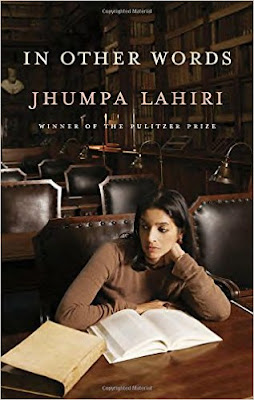In Other Words - A Review
It’s a memoir on a language project that Jhumpa Lahiri takes up for about three years of her life. It’s about her deep and personal journey of learning Italian, trying to master the language, living in a self-imposed exile from her dominant language English by reading and writing solely in Italian. It might come across as a strange project, yet bold, brave and not more than a few can fathom to take so huge a risk while being on the peak of one’s literary career. This autobiography is her first, yet the truest, most vulnerable- about her joys and failures, about being a foreigner forever, about belonging not in a country or a culture but in the margins. It is about seeking comfort and solace in discomfort, seeking freedom in limitations.
I loved this book. After almost a week of finishing reading it, I usually find myself opening a random page and re-reading it. I keep going back to the book.
She says in one of the chapters, when she reads Italian, she feels like a guest, a traveler. When she writes in Italian, she feels like an intruder, an imposter. And there! There she has laid bare so many of her insecurities that the reader might empathize with or might judge. I thought about the humility she has, after the huge successful task of jotting word by word in a foreign language and building a book. She still doesn’t feel Italian in her bones, in her marrow, she says. She still makes mistakes. Yet, as a lover of words, of language that is boundless and effable, I thought that the feat she has achieved in getting this book out is an immeasurable one. She literally went from being an illiterate in Italian to being almost Literate- from understanding words, forming phrases, structuring sentences, learning grammar to creating a full-fledged book. Salute to her and to her immense love for the language. Instead of learning it from the periphery in America, she decided to take the plunge, right into it, by coming to live in Italy, cutting off from her comfort zones.
“There is pain in every joy. In every violent passion a dark side.”
The author is seen as a foreigner in Italy because of her physical appearance. People didn’t want to listen to her or accept her as someone who knew their native language moderately well. They didn’t appreciate that she was working hard to speak their language. This irritated her. She felt reprimanded- ‘like a child who touches an object that shouldn’t be touched’. “Learning a foreign language is the fundamental way to fit in with new people in a new country.” Without language, you remain unheard, without a voice, without power. And these hurdles made her journey more meaningful.
There’s a chapter in the book, named ‘The Metamorphosis’. It is one of those chapters I kept rereading again and again. ‘Metamorphosis is a process that is both violent and regenerative, a death and a birth.’ She talks of change and transition as a way of life. She uses allegories, analogies from myths and Italian/ Roman legends, and elaborate stories to describe her feelings and her complicated situations.
‘The moments of transition, in which something changes, constitute the backbone of all of us. Whether they are a salvation or a loss, they are moments we tend to remember. They give a structure to our existence. Almost all the rest is oblivion.’
I would recommend this book to anyone who loves words and languages. If the unknown language charms you, makes you want to learn it, yet you feel daunted by the magnitude and vastness of the journey, this book is meant for you. I personally loved the book. My rating- 5/5
Linking the post to #UBC , and #DailyChatter.

Linking the post to #UBC , and #DailyChatter.










Comments
Post a Comment